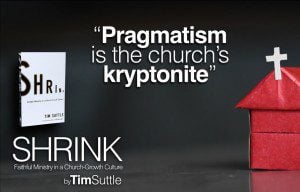 My friend and writing compatriot Katie Savage has written a review of Shrink, at her blog “Sprucing Up the Narthex.” Katie’s a really good writer (check out Grace in the Maybe), and I’m grateful for her engagement with the ideas in Shrink. Katie will always make you laugh and make you think.
My friend and writing compatriot Katie Savage has written a review of Shrink, at her blog “Sprucing Up the Narthex.” Katie’s a really good writer (check out Grace in the Maybe), and I’m grateful for her engagement with the ideas in Shrink. Katie will always make you laugh and make you think.
Here’s an excerpt from the review:
“The church is facing a huge problem,” writes author and pastor Tim Suttle. “We have become enamored with size. We have become infatuated with all things bigger, better, stronger, higher and faster.” In his new book Shrink: Faithful Ministry in a Church-Growth Culture (Zondervan, 2014), Suttle attempts to change the Christian leadership conversation. Faithfulness, he reiterates again and again, is the name of the game, not success.
This seemingly simple shift is a pretty big leap to make, though, when one considers the hold that success has on our culture. The first section of Shrink is titled “Don’t Try to Be Great.” In it is some of Suttle’s bravest stuff, and though it is written with church leaders in mind, it is valuable for anyone who calls her- or himself a Christ-follower. It is brave in articulating how easy it becomes for us to revere the giants, or to stroke our egos by striving for greatness and fame. Suttle says it this way: “If we honestly and critically assess the basic underlying assumptions on which we operate as Christian leaders, at the heart of the current leadership conversation we will find not the Christian narrative, but the American narrative of growth and expansion.”
The Jesus way, Suttle says, is down. It is humility, vulnerability, brokenness, generosity. Through our weakness, God’s power is made perfect, the Scripture tells us. Counter-cultural to say the least, and probably not how most would describe the culture of today’s church.
Suttle is not one to stop at a critique, though, and the gift of this book is how encouraging I believe it will be to pastors who feel that somehow they’ve failed or fallen short, whether they are pastors of megachurches or tiny congregations who meet in someone’s living room. Perhaps my favorite section is the last one, which is titled “Growing in Virtue.” It is about 100 pages in length– almost half the book– and it describes in very practical terms six virtues that will help pastors focus on faithfulness as they lead. It challenged me to nurture Christlike characteristics in myself and to go out of my way to care for the broken and weak in our neighborhood.
What sets Shrink apart from so many other church leadership books is its heart, which, of course, is the best kind of guts. As I read this book, it was easy to remember back a few months ago, when Tim was my pastor and I was sitting in one of the wooden chairs at his church in Olathe, Kansas. Included in the text are illustrations he’d used before in sermons, real-life examples from the life of our church, and a choked-up quality that Tim’s voice takes on whenever he talks about something he really cares about.












